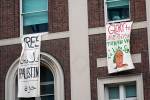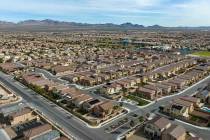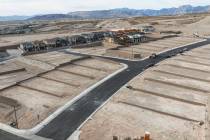Clark County tax bills going down


A retired homeowner received a pleasant surprise amid the dispiriting real estate slump: an $800 dip in his property tax bill.
The windfall was a significant boost to Robert Petty’s fixed income.
“It tickled the hell out of me,” said Petty, 81. “I’m on a pension. It’s hard to make ends meet.”
Petty is among the overwhelming number of Clark County property owners who received lower tax bills this year because a record number of property values have dropped in the recession.
The trend is double-edged, giving owners extra cash in the tough economy but exacerbating local governments’ budget problems.
Property tax revenue fell by about $470 million this year, with the pain spread across 80 taxing districts, including the county, three cities and library districts. Some local entities dealt with their budget holes by laying off workers, freezing job vacancies and trimming services.
Most homeowners who were interviewed say they haven’t felt the cutbacks in public services yet.
Government officials say they were able to minimize the impact to services, but the cuts could go deeper next year if property values continue to slide and the state raids local coffers to ease its own strained budget, the way it did in 2009.
An estimated 665,000 of the area’s 731,000 parcels, about 91 percent, lost enough of their value to yield smaller tax bills to the owners, according to the county treasurer.
Petty said it was unsettling to watch the value of his half-acre property plunge to $280,000 from $500,000, but he didn’t plan to sell it anyway.
He put his money into the bank to use later when he really needs it, he said, adding that growing up in the Great Depression taught him how to be frugal.
“I’m used to saving money,” Petty said. “I don’t spend money I don’t have.”
SOME CUTS GO UNNOTICED
Petty was hanging out with friends who were shooting pool at the Cora Coleman Senior Center off Lake Mead Boulevard.
One of the players, Don Lindsay, 56, took time between shots to talk about his tax break coming at the cost of his home losing 37 percent of its value.
“Almost $700 for the year,” Lindsay said of his savings. “It’s good. It’s only fair.”
He figures his house is now close to what it was worth when he bought it 6½ years ago. He said he is glad to get the tax reduction and so far hasn’t noticed government services being trimmed.
Petty said the county’s tightening budget hasn’t affected the senior center or other services he cares about.
The county lost almost $60 million in property taxes from its general operating fund, compounding a dip in sales tax and other revenue.
County officials have described taking a surgical approach to laying off 300 of its almost 11,000 full-time employees. The county also has left 1,200 jobs unfilled.
Most of the workers were laid off in departments tied to growth such as development services and comprehensive planning.
Some jobs were eliminated in social services, property management, public works and transportation.
Crews now pave fewer streets, do less maintenance on flood channels and replace fewer streetlights with more energy-efficient ones, said Erik Pappa, county spokesman.
Funds to prevent homelessness have diminished, forcing the county to reduce the financial aid it can offer the area’s poorest residents for housing, Pappa said.
Parks and recreation lost three supervisory jobs this year. Last year it began closing recreation centers an hour earlier and shutting down swimming pools two or three more days per week, said Steve Corry, the department’s assistant director.
Staff tries to close one pool while a nearby one is open to give patrons an alternative, Corry said. “We try to coordinate.”
The city of Las Vegas thinned its staff much more severely relative to its 3,000-person work force. It slashed 179 jobs overall to balance its books, including 50 in leisure services, 30 in public works and almost 20 in municipal courts.
It also eliminated jobs in finance, corrections, maintenance, building inspection, information technology and neighborhood services.
At Myron Leavitt Park in Las Vegas, a few local residents complained that the city has neglected maintenance at the dog park.
Nancy Sutter pointed to dog urine at the foot of a bench and said it had been there for months.
She and two other residents who were walking their dogs questioned why the city doesn’t install a canopy for shade.
“By 8 (a.m.), you’re baked,” Joanie Mares said.
“We have to come out at 5:30 in the morning,” Sutter said. “It’s horrible.”
Also, a curb where no parking is allowed is supposed to be clearly marked in red, but the paint has faded and unwitting park-goers are ticketed, Sutter said.
Every once, in a while a maintenance worker shows up, jots down the complaints and fixes a couple of glitches, though never the main ones, Sutter said.
Joel Classen, a 30-year resident, said he blamed the parks department’s leadership for the lapses in maintenance rather than the city’s tighter budget.
“It has nothing to do with the money,” Classen said. “It’s the people who are in charge.”
Sutter estimates she will save about $400 this year in property taxes.
She’ll probably toss the extra money at credit cards she tapped after her devaluing house prompted the bank to freeze a home-equity credit line she was using to pay for remodeling.
The tax savings are a meager consolation for her house depreciating to $125,000 from the $250,000 value it reached during the boom, she said. “I’d rather have a higher bill and more value in my house.”
OTHER CITIES, LIBRARIES COPE
North Las Vegas, Henderson and the Las Vegas-Clark County Library District also are grappling with waning tax revenues.
North Las Vegas laid off 188 employees, almost 10 percent of its 2,000-person work force, including in parks and recreation and public works. The city also slashed jobs through attrition.
The cutbacks could show up in little ways, such as streets being cleaned every three weeks instead of two weeks, and hours shortened at libraries and parks, said Alfonso Noyola, the city’s acting finance director.
Music festivals have been canceled as the city looks closely at events and amenities it can live without, Noyola said, noting that the city expects a $40 million decline in revenue next budget year.
“We’re watching that closely and putting together plans,” Noyola said. “Your expenses are climbing higher than your revenue coming in.”
Henderson had to offset an almost 20 percent dip in property tax revenue but avoided actual layoffs.
Instead, it eliminated about 200 vacant jobs, and partly by offering buyout packages to employees, said Kathy Blaha, city spokeswoman.
Union employees won’t receive cost-of-living raises for two years, and the city has been in a hiring freeze since 2008, Blaha said.
Some recreation centers close earlier, and none serve coffee anymore, she said. Since last year, North Las Vegas City Hall has been closed on Fridays.
A five-year contingency plan has been crafted to help the city deal with any future drop in revenue, Blaha said. “We’re just looking at it on a monthly basis and hoping for the best.”
The Las Vegas-Clark County Library District had to trim staffing and hours to offset a $5.5 million shortfall.
Libraries in urban areas now open an hour later and close two hours earlier. And with a leaner budget for buying materials, patrons will find it harder to find popular books on shelves and will have a longer wait when ordering copies, said Pat Marvel, library spokeswoman.
Shorter hours and less money mean fewer events in the evening, such as book readings by authors, Marvel said. Groups that meet in the library must finish by the 7 p.m. closing time or pay $10 an hour for a security guard to stay.
Rose Bell, 71, who left the Summerlin Library last week with a book tucked in her arms, said the shortened hours don’t bother her because she’s retired and has a flexible schedule.
However, she has noticed the thinning stock of books. Sometimes she must wait weeks for a book she has ordered, and sometimes, a book she wants is unavailable because none of the local libraries bought it, she said.
Bell said she and her husband got a break on their property taxes, but she would be glad to pay more taxes to support schools and services such as the library.
“I think older people like us should be willing to help our children,” Bell said. “I’m sorry to see what happened with property values, but our property values were over-inflated to begin with.”
LEGISLATIVE MONEY GRAB FEARED
As if plowing through this bleak financial period weren’t enough, local governments face the prospect of the state Legislature dipping into their funds to fill a shortfall that could reach $3 billion.
In 2009, the state pulled revenue strictly from Clark and Washoe counties. Legislative actions, which included fee increases, a revenue grab and state funding cuts, will cost Clark County $180 million over the biennium. Next year, other sizable local governments in the state could be targeted.
Clark County joined other counties in putting an advisory question on the November ballot asking voters whether the state should get local governments’ permission before raiding their coffers. Local cities passed resolutions supporting the sentiment.
“It’s definitely on our minds,” said Blaha, the Henderson spokeswoman.
No one knows how much the state might take or which funds it would go after, she said. Scooping money from the city’s depleted coffers might not result in a recreation center closing, but residents would notice some impact.
“We’ve been constantly cutting our budget for two years,” Blaha said. “At some point you’ve got to cut your staff.”
There’s also talk that, aside from taking money, the state might turn over some of its programs to local governments, increasing their financial burdens, said Shari Buck, North Las Vegas mayor.
“That will be difficult to impossible when we’re going to cut $40 million out of next year’s budget,” Buck said, adding that it could lead to hundreds of layoffs.
State-funded social, medical and education programs are among the services that could be pushed onto local governments’ shoulders, county officials say.
Las Vegas Mayor Oscar Goodman and other city leaders have expressed concerns that the city will lose money to the state in dire economic times.
Sabra Smith Newby, a Clark County lobbyist, said every effort will be made to help the state with its budget crisis, within reason.
“We’ve always tried to work with the Legislature,” she said. “But if you don’t have it (money), you don’t have it. You can’t squeeze blood from a turnip.”
Contact reporter Scott Wyland at swyland@review journal.com or 702-455-4519.


















